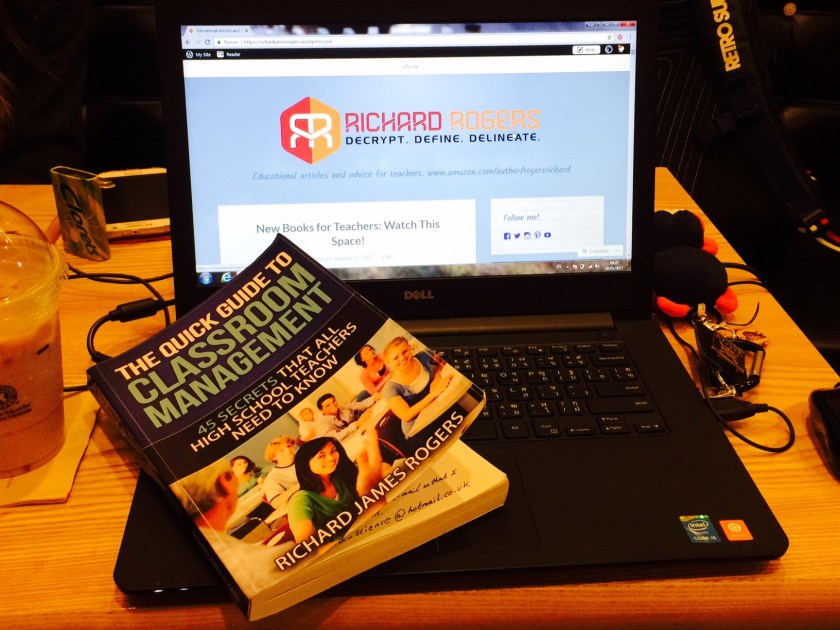An article by Richard James Rogers (Award-Winning Author of The Quick Guide to Classroom Management and The Power of Praise: Empowering Students Through Positive Feedback).
Illustrated by Pop Sutthiya Lertyongphati
Accompanying podcast episode (audio version of this blog post, read by Richard):
Examinations really are the most visible culmination of what we do as teachers. They offer a no-nonsense assessment of student competency in particular subject areas and their results are still to this day considered to be the ‘gold standard’ of many schools: forming the basis of rankings’ systems, such as league tables, in many countries.
Whether we like it or not, the reality is that grades matter. They matter to parents; to the students taking the exams; to universities; to colleges; to employers and, unfortunately, to the teachers who are supporting the students (who may themselves be under pressure to raise attainment and get ‘good grades’).
I could have chosen to write about the great debate surrounding the real importance of grades, and the gracefully-aged topic of ‘skills vs knowledge’. That may be a good topic for another blog post, but today I’m going to get right down to the cold, hard-truth of what you really need to know: how to best prepare your students for their exams. So strap on your seatbelt: this is going to be a exhilarating ride!
Tip #1: Do past-papers under timed conditions
This is tip number one because, quite simply, it is the very best way to prepare your students for upcoming exams. Of course, you will have to have at least covered the content in-class before giving past-paper questions, but make sure that at some point your students do those questions!

Past-paper questions really give students the crucial experience of dealing with examination language and style – an experience that they can’t really get from any other source. You may wish to give past-paper questions covering a single topic for homework, or make your end-of-topic tests out of past-paper questions (highly recommended).
One technique I have started using with my IGCSE Physics students is the 20-10-20 technique: the students do 20 minutes of questions (which equates to 20 marks, in my case), followed by 10 minutes of peer-assessment using the official mark schemes. After this, I do a 20 minute review of the questions, going through each part in-detail.
This technique works for me because my lessons are all 1 hour long, so I can fit a 20-10-20 session into selected slots each week. For you, you may have to adapt this strategy to fit the timeframe of your lessons.

It is crucial that, at some stage, your students start doing past-paper questions under the same time-conditions of the exam. This will train them to write quickly and concisely – a massive key skill, as many good students lose marks simply because they run out of time in the real exam.
Tip #2: Use exam-prep software and websites
We really have to take advantage of all of the EdTech tools out there: many of which are available for free! Here are some great generic websites that I recommend (these can be used for any subject area, and all are free to use too):
- Quizziz: Try the ‘live quiz’ and watch your students jump with joy as they compete with each other to answer examination questions. Quizziz contains many pre-prepared quizzes so you may find that you don’t even need to create one from scratch.
- Quizlet: This is really awesome for reinforcing key words and definitions, and has a number of integrated games within the system that students can play (Hint: Try the ‘Match’ and ‘Gravity’ games – they’re awesome!). Don’t forget to try out Quizlet Live, which can be done in teams or as individuals – again, just like Quizziz, students compete with each other for points by answering questions.
- Kahoot!: This is a great multiple choice quiz-based system: another spin on the Quizlet and Quizziz concept, basically. Again, students can compete as individuals or as teams.
- BBC Bitesize: An old classic for a good reason – it’s awesome! The site contains some of the best revision notes on the web, and topics often have a multiple choice test at the end which is usually out of 10 (allowing for a quick percentage calculation). BBC Bitesize notes now have questions integrated into the notes themselves, making the website more interactive today than ever before.
- Seneca Learning: I love this website! It’s like BBC Bitesize but more interactive, in my opinion. Students log in to the site (it’s free, but sign up is needed) and go to the course they are currently studying (e.g. GCSE German). Notes will then be displayed on-screen with questions throughout to test knowledge and understanding. One reason I love Seneca is that notes are divided by syllabus section and Seneca’s database keeps getting bigger each year (they now have some IB Diploma courses on there, for example).
Tip #3: Project work
Give your students revision projects to do: such as creating a Google Slides that covers a particular topic, and then presenting that to the class. Just make sure that when you do this you specify a strict time-frame and assign roles: does each member of the group know what their job is?

I recently did such a project with my Year 11 Physics students. They had to create an audio clip, Google Slides, worksheet and model answers covering the Magnetism and Electromagnetism topic in the syllabus. Every person had a distinct role (e.g. one person made the audio clip, one person did the worksheet, etc.) and this was a great skill-building task, as well as a great revision activity.
Tip 4: Offer designated revision time with suggested techniques
If you have time, then you may wish to use the lessons on the run-up to tests and assessments as ‘revision lessons’. This can be time in which students make flash cards, create Mind Map summaries, record audio notes, quiz each other or perhaps work through a Seneca section (see earlier notes). You might want to give your students some training in effective revision techniques prior to the session, and supplying materials (e.g. for making flash cards) is a good idea too.

Tip #5: Do a practice exam before the real thing
This is an awesome idea which I don’t think is used enough for low-stakes assessments. Even with younger learners who have an end-of-topic test coming up, a practice test can be a great way to offer a stark ‘wake-up’ call: shedding light on areas of strength and weakness, as well as providing the students with essential ‘exam technique’ experience. Students should be relaxed during this process and should know that this is not the final test, but is still important as it will inform them of what to focus on in their revision. For students who don’t finish on-time, it will offer a good opportunity to discuss strategies to speed-up, such as avoidance of ‘waffling’ and the importance of reading each question thoroughly (so that they don’t ‘go off at a tangent’ in their answers).

We welcome you to join the Richard Rogers online community. Like our Facebook page and follow us on Twitter for daily updates.




